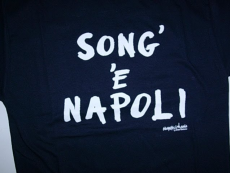
Email: emanuelealbertocirello.98@gmail.com
Total Article : 76
About Me:I am a Year 13 student which aspires to be an architect. I am interested in anything I don't yet know, and I mostly write about art, politics , Italian culture and inspirational people, although I will try to write for as many categories possible, just to test myself and get to know more things.

Naples is one of the Italian cities that has had a very intense and tumultuous history; it has always been a melting pot of cultures and populations as it has been subject to the dominations of various foreign reigns and rulers. All this dynamism in the city’s history and the social texture have affected enormously the formation of its own dialect and, with time, its vivid culture.
Starting from the domination of the Greeks, Naples was by them funded in the VI century BC, and ancient Greek has had an influence on the Neapolitan dialect. “Pazziare”, which means “giocare” (to play), derives from the Greek word “pàizein”. In addition, “paccaro”, which means “schiaffo” (slap), derives from the Greek word “pasa cheir”. The influence of Latin has also been very important. Since 326 BC, the city was a Roman colony, and Latin was used as the language until 1200. From the Latin term “intras acta” derives the Neapolitan term “‘ntrasatta”, which means “all of a sudden”. In the XIII century, the Neapolitan dialect started to gain a solid shape. The following dominations also added to the existing dialect. “Ajére”, which means “ieri” (yesterday), comes from the Spanish word “ayer”. “Canzo”, which means time, derives from the French word “chance”.
In its numerous variations, Neapolitan is used in most of southern Italy: in Campania especially but also in Abbruzzo, Calabria and Molise. It is estimated that, across the globe, 11 million people speak this dialect. It is more spoken than Swedish and Bulgarian and it is the 77th most spoken idiom. It is spoken in Canada, USA, Brazil, United Kingdom, France, and Belgium and pretty much in every place where southern Italians have migrated. Many Neapolitan words have become popular through the rise, on an international scale, of the Neapolitan music.
In Naples, the dialect is used as a mother language. It is used as much, if not even more than Italian itself is. Italian is mostly used in formal occasion, but for the most frequent informal occasions with family and friends, the dialect is largely used as a substitute. The grammar rules of this dialect are just as the ones that characterise any type of spoken idiom, as they revolve around pronunciation, spelling, vocals, consonants, nouns, verbs and so on. I would not and I could not be able to list every rule and show them, as you would probably need a full dialect course.
One simple rule that you must know is easy to memorise; most of Neapolitan words have no vowels at the end, many in fact form by dropping the last vowel of the corresponding Italian word. Unfortunately, this is only one of the rule and speaking Neapolitan is not this easy; many terms in dialect do not have a corresponding Italian word, and sometime they refer to as concepts rather than words.
Neapolitan is a very colourful language, and as such, Neapolitan proverbs and sayings are funny, irreverent, sarcastic and subtle, as well as prophetic, cynical and bitter. These are about human nature, our way of living and metaphors for past events that still have significance in our modern time.
The UNESCO has established that Neapolitan is an official language, but for the Italian government and society it is a sub-language, a mere and rural dialect that is only spoken in certain areas of the country. Even though it is the second most spoken language in Italy, and despite the fact that it has an own literature, music and culture it is overlooked and considered irrelevant.
Let it be a language or a simple dialect, it needs to be protected, preserved and studied just as every other widely spoken language should. The extinction of this idiom would be, in my opinion, the representation of the cultural decline of southern Italy, as it is our language, in which we identify ourselves; its death would be the death of our culture and heritage.
Image credits: http://vivailnapoletano.blogspot.co.uk/2010/04/curto-e-male-ncavato.html

0 Comment:
Be the first one to comment on this article.